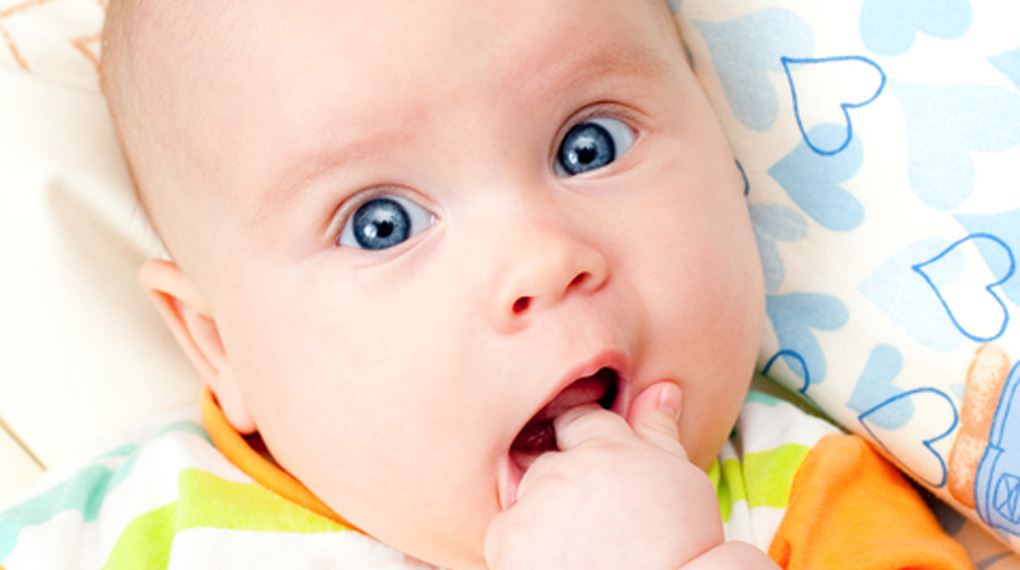Teething in babies starts when they are around 6 months old. Although, some babies may start teething as early as 3 months or as late as 12 months. It is a milestone that parents look forward to, as it marks the beginning of their baby's growth and development. However, it is also a phase that can be very uncomfortable for the baby and stressful for the parents.
10 Signs Of Teething To Look Out For
1. Drooling:
 One of the most common signs of teething is excessive drooling. Your baby may drool so much that you may have to change their clothes several times a day. To prevent rashes on their chin and neck, always keep a bib handy.
One of the most common signs of teething is excessive drooling. Your baby may drool so much that you may have to change their clothes several times a day. To prevent rashes on their chin and neck, always keep a bib handy.
2. Irritability:
 Teething can be a painful and uncomfortable experience for babies. They may become fussy, irritable or cry for extended periods of time. Try to comfort them by gently rubbing their gums with a clean finger or by giving them a teething ring to chew on.
Teething can be a painful and uncomfortable experience for babies. They may become fussy, irritable or cry for extended periods of time. Try to comfort them by gently rubbing their gums with a clean finger or by giving them a teething ring to chew on.
3. Biting:
During teething, babies have an urge to chew on things to soothe their gums. They may bite on their toys, fingers, or even you! Provide them with age-appropriate chewable toys to help with the teething process.
4. Sleeplessness:
Due to the discomfort of teething, your baby may have trouble sleeping at night. Be sure to stick to your usual bedtime routine and try to soothe your baby with lullabies or gentle rocking.
5. Loss of Appetite:
 During teething, your baby's gums may be too sore to eat properly. Don't worry, this is normal. Offer them soft foods that are easy to swallow, such as pureed fruits and vegetables or soups.
During teething, your baby's gums may be too sore to eat properly. Don't worry, this is normal. Offer them soft foods that are easy to swallow, such as pureed fruits and vegetables or soups.
6. Cheek Rubbing:
If your baby rubs their cheek, it could be a sign of teething. The pressure from rubbing helps to alleviate the discomfort in their gums.
7. Ear Pulling:
Babies may also pull on their ears during this phase. This is because the pain in their gums may radiate to their ears. Consult your pediatrician if you notice any signs of infection like fever or ear discharge.
8. Inflammation of Gums:
Inflammation of the gums is another sign of teething. You may notice that your baby's gums appear red, swollen or sensitive to touch.
9. Excessive Crying:
Teething can be a painful experience, and your baby may cry a lot more than usual. Try to soothe them by holding them close, talking to them or singing to them.
10. Diarrhea:

10 Tips To Soothe Teething Babies
Now that you know the signs of teething, here are some tips to soothe your baby:
1. Give Them A Cold Washcloth:
Wet and wring out a clean washcloth, then place it in the refrigerator or freezer for a few minutes. This will provide your baby with a cool and soothing sensation to help alleviate the discomfort in their gums.
2. Try Teething Rings:
Provide your baby with a safe and age-appropriate toy to chew on. Teething rings are perfect for this purpose as they come in various textures and shapes to provide maximum comfort.
3. Use A Teething Gel:
Ask your pediatrician for a teething gel that contains benzocaine or lidocaine, which help to numb the gums and relieve pain. Be sure to follow the dosing instructions carefully.
4. Massage Your Baby's Gums:
With clean hands, gently massage your baby's gums to provide some relief. This should be done when your baby is awake and alert, so you don't risk getting bitten.
5. Try A Humidifier:
If your baby is having trouble sleeping due to teething, try using a humidifier in their room. The added moisture in the air can help soothe their throat and nasal passages.
6. Use A Bib:
To prevent rashes from excessive drooling, always keep a bib on your baby. Change it frequently and make sure to keep their chin and neck clean and dry.
7. Give Them Cold Foods:
Cold foods such as yogurt, applesauce or pureed fruits can provide relief to your baby's sore gums. Just make sure that the food is not too cold and that it does not require chewing.
8. Use Acupressure:
Pressing gently on certain acupressure points in your baby's body can provide relief from pain and discomfort. Ask your pediatrician on the correct technique for this.
9. Try Distraction:
Distract your baby with different activities like reading books, singing songs or playing with them. This will divert their attention from the discomfort in their gums.
10. Comfort Them:
Most importantly, comfort your baby with your presence, words and touch. Give them all the love and attention they need during this trying phase.
It is important to remember that teething is a natural and normal part of a baby's development. Although it can be a trying phase for both the baby and the parents, it will pass. If you notice any signs of infection or if your baby's discomfort persists, be sure to consult your pediatrician.
View more articles about Teething In Babies Starts When